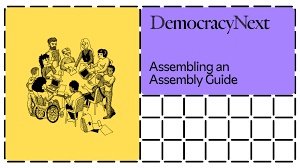
https://assemblyguide.demnext.org/
https://www.demnext.org/uploads/DemocracyNext-Assembling-an-Assembly-Gui...
The Assembling an Assembly Guide is a resource for any institution, organisation, city administration, or policy maker interested in running a Citizens’ Assembly. It is also a useful tool for citizens and activists wishing to learn more about what a Citizens’ Assembly is and how it works, in order to strengthen their advocacy efforts.
This 3-stage guide will accompany you through the different steps of designing, running, and acting on the results of a Citizens’ Assembly. It draws on and points to a curated selection of the best available resources. From deciding how to choose and define an issue, to setting the budget, timeline, and which people to involve, this guide aims to make it a simple and clear process.
Prepared by DemocracyNext, a non-profit, non-partisan research and action institute founded by the people who developed the OECD Deliberative Democracy Toolbox, it embeds the OECD Good Practice Principles of running a high-quality Assembly. The guide will be continuously updated and enriched with new resources.
Whilst we hear endlessly about the crisis of democracy, something remarkable and hopeful has been happening right under our noses: a new kind of democracy is taking root. Over the last few decades, governments have been reaping the benefits of Citizens’ Assemblies - a democratic model that has been tested, widely implemented, and even embedded into public decision-making as new institutions connected to power and underpinned by a legal basis.
A Citizens’ Assembly is a group of people selected by lottery who are broadly representative of a community. They spend significant time learning and collaborating through facilitated deliberation to find common ground and form collective recommendations for policy makers, decision makers, and the community. These Assemblies are sometimes called Citizens’ Juries, Panels, or Councils depending on their size and the country where they are taking place.
As governance systems are failing to address some of society’s most pressing issues and trust between citizens and government is faltering, Citizens’ Assemblies embody the potential of democratic renewal. They create the democratic spaces for everyday people to grapple with the complexity of policy issues, listen to one another, and find common ground. In doing so, they create the conditions to overcome polarisation and strengthen societal cohesion. They bring out the collective intelligence of society — the principle that many diverse people will come to better decisions than more homogenous groups.
OECD research has shown that well-designed Citizens’ Assemblies help public decision makers take hard decisions and enhance trust, because they:









